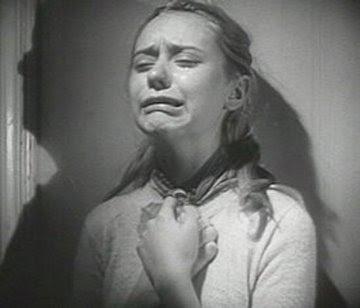 |
| I've heard it's for the birds! HA! Get it? For the birds? 'Cause he's a... aw, forget it. |
Hello, moviegoers!
So you think you're tough, eh? Jaded? Hardened? Impervious to mildew and rot? Is that the idea? You say you snickered at Salo, scoffed at A Serbian Film, and snoozed through Saw? Well, let me tell you something, cream puff! You haven't seen anything yet.
Prepare yourself for the unrelenting cinematic torture test that is... Habit Patterns.
 |
| And this is how the film starts! |
Habit Patterns is a 14-minute-long educational film produced in 1954 by Knickerbocker Productions for the McGraw-Hill textbook company. (McGraw is still around. Knickerbocker? Long gone.) It is also quite possibly the most brutal film I've ever seen. The difference is that, in contrast to most films we consider "violent," the brutality on display in Habit Patterns is entirely emotional. Neil LaBute on his most misanthropic day could not conceive of a film this gut-wrenching and difficult to watch.
If you think that the 1950s were all poodle skirts and sock hops or if Grease has convinced you it would be a lot of fun to be a middle-class suburban teenager in Eisenhower's America, then Habit Patterns will be a valuable education for you.
What we have here is a day in the life of Barbara, a sweetly insecure teenage girl who is punished without mercy for her sloppy habits. She endures a gauntlet of humiliation throughout the film and is harangued non-stop by a pitiless female narrator. Indeed, the film's first line of narration has acquired an infamous reputation: "It's a little late for tears, isn't it, Barbara?"
The narrator -- and everyone else in the movie -- would like Barbara to imitate the example set by one of her peers, Helen, a bloodless, soulless conformist automaton whom the movie treats as the "perfect" teenager. Barbara is the only person in the movie with a hint of a personality. In fact, she's the only one in the movie even recognizable as a human being. That makes her ordeal all the more painful to witness.
The movie's queasy score makes things worse. As the strings ominously descend the chromatic scale each time Barbara screws up or feels uneasy, I could not help but think of Pino Dinaggio's score for Carrie, another film about a vulnerable teenage girl who is berated and humiliated because she does not conform.
Watch if you dare!
Phew! That was an emotional workout. Honestly, few films have ever affected me as strongly as Habit Patterns did. I first learned of the film through Ken Smith's wonderful book, Mental Hygiene: Classroom Films 1945-1970, which really is a must-read, and by luck the film was included on the companion video for the book. Still today, even after at least a dozen viewings, I cringe when I watch it. Credits for the film are hard to come by, so I don't know who played whom, but I felt bad for the actress playing Barbara. She does a great job, though, portraying the character's emotional torment.
I reiterate that the 1950s were probably not nearly so fun as Back to the Future and Sha Na Na have led us to believe. As an antidote for Habit Patterns, I happily present this wonderful parody version, apparently staged as part of a show called Industrials by the Ministry of Cultural Warfare at the 2003 Minnesota Fringe Festival.
Habit Patterns from Matthew Foster on Vimeo.

An interesting dated film, an exaggerated review. Seriously, I remember creepy movies like this designed to embarrass an individual into behaving in a more acceptable or conventional manner.
ReplyDeleteThe good old 50s. I miss them. There were fewer dangers. What do you think is better about that era, what is worse?
Thanks for commenting. I promise you, not one word of this review is exaggerated. It conveys as honestly and directly as possible the way I felt about the film. Habit Pattern really struck a chord with me because I identified so strongly with the main character, and the film treats her so badly.
ReplyDelete